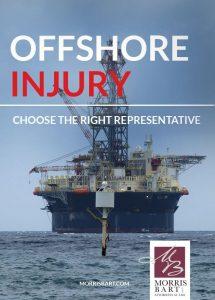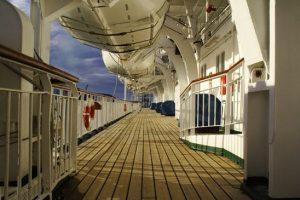
Most people are not familiar with workers’ compensation claims until they sustain an on-the-job injury. Unfortunately, it is not always easy for injured employees to recover the compensation they deserve. This is especially true for workers on seafaring vessels.
Most people who work on ships on the open ocean are not covered by any state’s workers’ compensation program. Instead, they rely on federal laws to allow them to seek medical care coverage, lost wages, and other losses following an on-the-job injury.
How Sailors Recover Compensation Following an On-The-Job Injury
Insurance companies and employers often prioritize their financial interests over those of policyholders and employees. It is not uncommon for workers’ compensation claims to be denied or undervalued, which is why claimants should enlist the help of a personal injury attorney to protect their interests.
If you were injured on a ship, then you may be able to recover compensation by making a claim under the Jones Act. According to the American Maritime Congress, the Jones Act serves as one of three key pillars of the United States Merchant Marine law. It protects the rights of seamen who fall ill or sustain injuries while performing work-related duties.
It also allows seamen and sailors to file claims against their captain, crew members, or the boat owner if their injuries result from negligence.
Building a Jones Act Case After an Injury or Illness
However, making a successful claim under the Jones Act is a legally complicated process. You must meet strict eligibility requirements and provide extensive evidence to prove you are entitled to compensation.
A Baton Rouge personal injury attorney from Morris Bart, LLC, will evaluate your case to determine if you have grounds for a claim. You may be entitled to compensation for lost income, medical bills, and other damages. Schedule a free initial consultation today by calling 800-537-8185.
For a free legal consultation, call 800-537-8185
Common Causes of Injuries on a Seafaring Vessel in the Gulf
Read on to learn about five common causes of injuries on ships:
-
Exposure to Dangerous Gases and Chemicals
If a worker is exposed to dangerous gases or chemicals—particularly in a small or enclosed space—then they may become severely ill. Workers aboard ships should always wear appropriate protective equipment when handling or transferring harmful gasses and chemicals.
It is important to know that illnesses caused by exposure to harmful substances may also support a Jones Act claim. Not only acute injuries directly stemming from a recent accident may qualify. If a covered sailor receives a diagnosis of a condition definitively linked to an onboard exposure, they likely have a case.
-
Falling Overboard
Falling overboard is one of the most dangerous situations for the crew while at sea, according to Marine Insight. Seafarers who fall overboard risk drowning and hypothermia.
According to the Mayo Clinic, hypothermia can cause heart failure, respiratory system failure, and death. It can also cause symptoms such as confusion and loss of mobility that make it harder to avoid drowning.
Lasting effects for survivors could include traumatic brain injuries (TBIs), loss of limb if hypothermia is severe, nerve damage, and physical limitations.
-
Explosions
Large ships require complex machinery to function, and a defect could cause a devastating explosion. Many explosions at sea are due to improper maintenance. Depending on the purpose of the ship and the cargo on board, they may also work with flammable and explosive materials, which increases the risk of a fire.
-
Electrocution
Loose wires, poor grounding, and outdated insulation often contribute to electrocutions on ships. These can cause cardiac arrest, muscle, tissue, and nerve damage, and thermal burns. Shipowners and operators have an obligation to keep their vessels up to date, well-maintained, and safe for their crew. This includes their electrical systems.
-
Slips and Falls
Ships are unstable and often have wet surfaces. Some sailors also work at great heights. Falls are common aboard a commercial vessel operating on the open sea. This includes slips, trips, and falls from an elevated height. All three can cause significant injuries and require medical care.
A fall on a ship can result in devastating injuries. Workers are at a particularly high risk of these accidents when they do not have access to essential safety equipment, such as ropes, harnesses, and non-slip shoes. Boat owners and employers of seamen must provide adequate and appropriate personal protective equipment for their team, including safety harnesses and other gear for those who work far above the deck.
What Should I Do If I Suffered an Injury on a Seafaring Vessel?
If you were hurt while working on a ship or another seafaring boat, you may be able to pursue compensation based on the Jones Act or another federal law. The most effective way to learn more about your potential case is to meet with a personal injury attorney who handles these claims. They should be able to review your case and explain your legal pathways to hold the boat owner or another party responsible.
Most firms will allow you to speak with a lawyer for free during a complimentary, no-obligation, confidential consultation. You can ask questions and learn more about your rights. They will also explain how contingency fee representation works. They should not ask you for any payment at this time. You pay them attorneys fees only if you recover compensation.
Click to contact our personal injury lawyers today
Speak with a Jones Act Lawyer from Morris Bart, LLC, for Free
If you sustained an injury while working at sea, contact a Baton Rouge accident lawyer from Morris Bart, LLC. We have been representing the injured for more than 30 years, and our legal team will give your case the individual attention that it deserves. We provide complimentary case reviews for those who believe they may have a Jones Act claim.
Call to schedule a free initial consultation.
Questions?Call 800-537-8185
to find a Morris Bart office near you.




